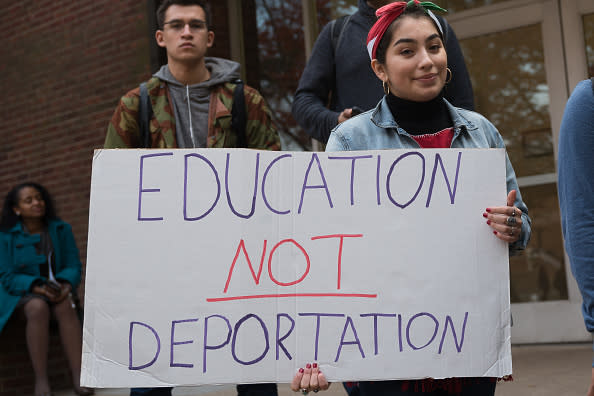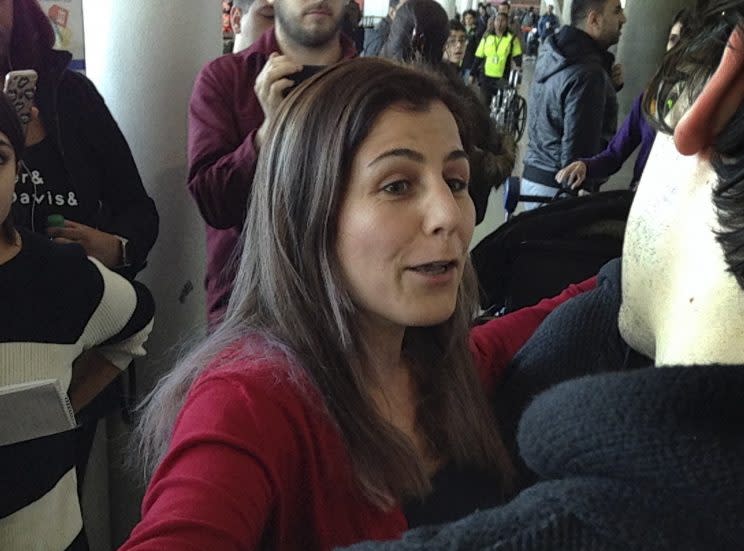How Trump’s immigration order 'dealt a blow to higher education'
Donald Trump’s 90-day travel ban on citizens from seven Muslim-majority countries — Iran, Iraq, Libya, Somalia, Sudan, Syria and Yemen — struck a chord with academic America.
“The order is stranding students who have been approved to study here and are trying to get back to campus, and threatens to disrupt the education and research of many others,” the nonprofit Association of American Universities stated on Saturday evening.
That group represents 60 US research institutions, including Columbia, Cornell, Duke, Harvard, Johns Hopkins, MIT, Northwestern, Stanford, the University of California system, UChicago, UPenn, Yale, and the University of Michigan, among other prestigious universities.
University of Michigan President Mark Schlissel was among the first college presidents to refuse to release students’ immigration status, reiterating the institution’s nondiscrimination policy. “Once students are admitted, the university is committed to fostering an environment in which each student can flourish,” his statement read.

Beyond a humanitarian perspective, some people outside academia argue the loss of these international students will hurt universities’ bottom lines. David Kotok, the chairman and chief investment officer of Cumberland Advisors, a portfolio management firm, expressed his concerns around the move, specifically from an investing standpoint, in a note to his clients.
“[Trump] impairs knowledge transfers. For example, one of the large exports of America is education. Our universities sell courses and academic degrees, and foreigners come here and buy them and mostly pay cash in US dollars,” he said.
“Billions are transferred each year. University education for Americans is subsidized by foreigners who occupy seats in classrooms and do so as paying customers. Look at any of our schools for evidence. Ask any dean or provost what his school’s financial structure would look like if there were no foreign students enrolled. Trump has dealt a blow to higher education with an executive order. The pain will be felt by Americans,” he added.
Kotok brings up a valid argument. International students contributed an estimated $35 billion to the US economy in 2015, according to the US Department of Commerce, up from $31 billion in 2014.
International students in the US topped 1 million for the first time in 2016, according to a new report from the Institute of International Education, a nonprofit that collaborates with governments and education foundations around the world. Though foreign students only make up 5% of students in the US higher education system, they represent strong growth among students in the STEM fields (science, technology, engineering and mathematics).
Among the countries listed on the temporary ban, Iranian students, in particular, make up a bulk of foreign students studying in the US. Students from Iran increased by 8.2% between 2015 and 2016 — hitting 12,269 students, the highest US enrollment by Iranians in 29 years, according to IIE.

The ban has affected students like Vahideh Rasekhi, an Iranian who was returning from a trip to visit her family just after Trump issued his order. Rasekhi was initially told that she would not be allowed to enter the US. But with the aid of volunteer lawyers from the International Refugee Assistance Project and the Legal Aid Society, Rasekhi was released over 16 hours later.
Rasekhi, a sixth year doctoral student in linguistics, serves as the president of Stony Brook’ University’s graduate student organization. She came to the US as a Fulbright Scholar at UC Santa Barbara and subsequently received her master’s degree in linguistics.
In a statement to Yahoo Finance, she says she had recently traveled to Iran to visit her family and “it was such a blessing to be able to visit with them again.” She is thankful to have the opportunity to return to her dissertation research.
Blocking out immigrants from countries like Iran would not only disrupt the lives of people like Rasekhi, but it could also do lasting damage to the US economy.
Melody Hahm is a writer at Yahoo Finance, covering entrepreneurship, technology and real estate. Read more from Melody here & follow her on Twitter @melodyhahm.

